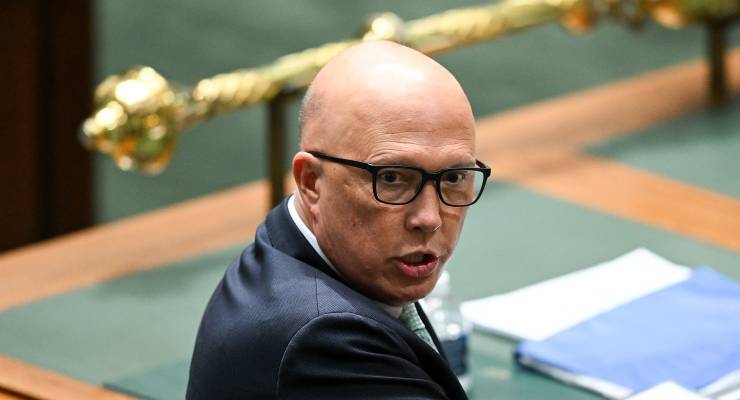
Peter Dutton wants to make Australia a nuclear powerhouse, but it may be decades too late to achieve that, an expert says.
The Coalition’s new energy vision was outlined in an article in The Australian on Tuesday morning, where opposition energy spokesman Ted O’Brien said reactors of all sizes were of interest: large-scale, small and modular, and micro-sized.
“I wouldn’t touch old Soviet-era nuclear reactors with a barge pole, but new and emerging nuclear technology is something else altogether … Any coal-to-nuclear strategy should consider different types of new and emerging nuclear technologies, from advanced micro reactors to small modular reactors and next-generation large reactors,” he was quoted as saying.
At the moment, the nuclear push is no more than a plan to formulate a plan. The policy would be taken to shadow cabinet, a backbench committee and the partyroom before being launched ahead of the May budget.
But Dutton clearly reckons the idea will be a vote-winner ahead of the next federal election. Ahead of last weekend’s Dunkley by-election, Crikey understands some Victorian Liberals were privately grumbling the party didn’t have enough new policies to present to voters. After the failure to wrest the seat from Labor, several federal Liberal MPs told The Sydney Morning Herald they were frustrated Dutton hadn’t “released more policies to try and win back voters to the Coalition cause”.
Cue Dutton’s nuclear announcement. In an interview on Seven’s Sunrise program, the opposition leader swatted away a question about why the Coalition hadn’t begun the work on facilitating nuclear power during their 11 years in power.
“Well, nuclear has been spoken about back to Bob Hawke’s day. I mean, Bob Hawke was very strongly in favour of nuclear, as is John Howard, and most analysts now look at what’s happening in other countries, and the small modular reactors, for example, is a new technology. It doesn’t resemble anything that you’ve seen in the past,” Dutton said.
But according to Ian Lowe, emeritus professor at Griffith University’s School of Environment and Science, Dutton’s plan is “a dumb idea, really an act of desperation”.
“It doesn’t make economic sense. It doesn’t make energy sense. It doesn’t make political sense,” Lowe told Crikey. “It’s difficult to understand how people who can read joined-up writing and do takeaway sums think that nuclear power makes any sense for Australia.”
In Lowe’s view, Australia’s last chance to get on the nuclear power train would have been in 1969, when the Gorton government drew up plans for a nuclear reactor at Jervis Bay, a project that was scrapped two years later by the incoming McMahon government.
“Treasury had processed the tenders for the power station and concluded that it was going to be hopelessly uneconomic, so McMahon paused the program and then the Whitlam government cancelled it,” Lowe said.
“If we built a nuclear power station, then in the 1970s, we would have the expertise and it might make sense to keep building them, but even then, there’s not much building of nuclear power going on anywhere in the world except China, because it just doesn’t make economic sense.”
The next-generation reactors envisioned by the current Coalition team have been talked about for decades but do not yet exist, Lowe said: “Nowhere in the world can you write a check and buy a small modular reactor, they still don’t exist. They’re still on the drawing board. And so if you’re talking about next generation and small modular reactors, you’re basing your energy policy on the hope that the new technology which hasn’t yet been developed, hasn’t yet been demonstrated, will appear overnight and meet our energy needs. And that’s really a pretty desperate hope.”
Lowe, who was a member of the expert advisory committee for the 2015-16 South Australia Nuclear Royal Commission, said there would be no hope of developing a nuclear power industry in Australia before the 2040s, and by that time, solar, wind and bioenergy would likely be able to cover the country’s needs.
“The problem [with renewable energy] is that we don’t have enough storage to be able to provide secure supply on cold and still winter nights. But the timescale for developing storage is much shorter than the timescale for building a nuclear power station,” he said.
The government, predictably, isn’t impressed with Dutton’s plan either, with Prime Minister Anthony Albanese saying on Monday the nuclear push was “just an excuse for inaction on cheaper and cleaner energy”. (It’s worth noting Labor’s own goal to increase the share of renewables in the national electricity market to 82% by 2030 isn’t on track to be met).
As another part of the post-Dunkley reset, Dutton on Tuesday presented an updated shadow cabinet, which included Melissa McIntosh as energy affordability spokesperson. She’s been far from a loud voice on energy and nuclear issues, but in her new role she will help O’Brien in “formulating policies that take the economic pressure of rising electricity prices off families”, Dutton said.
Is Dutton just scrambling for a policy idea, or does his nuclear push have legs? Let us know your thoughts by writing to letters@crikey.com.au. Please include your full name to be considered for publication. We reserve the right to edit for length and clarity.








Crikey is committed to hosting lively discussions. Help us keep the conversation useful, interesting and welcoming. We aim to publish comments quickly in the interest of promoting robust conversation, but we’re a small team and we deploy filters to protect against legal risk. Occasionally your comment may be held up while we review, but we’re working as fast as we can to keep the conversation rolling.
The Crikey comment section is members-only content. Please subscribe to leave a comment.
The Crikey comment section is members-only content. Please login to leave a comment.